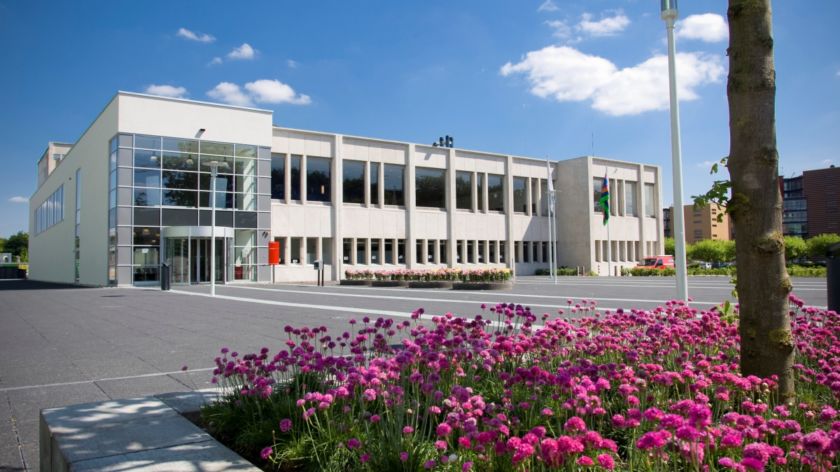How racist was Linnaeus?
-
 Het Linnaeusgebouw. Foto: RU
Het Linnaeusgebouw. Foto: RU
Linnaeus is 'the founder of scientific racism', Sarah Bouelehoual wrote last week in an opinion piece. Willem Halffman, senior lecturer in Science & Technology Studies, believes that the truth is just a bit more complex. ‘Why are all the buildings on campus named after Western scientists?’
Last week, candidate AKKUraatd party leader Sarah Boulehoual wrote an open letter to Han van Krieken asking for the Linnaeus building to be renamed. Linnaeus, who was the first to systematically categorise plants and animals, in the eighteenth century, is accused of being the founder of biological racism. He divided people into different races, placing ‘European’ at the top of the ranking and ‘African’ at the very bottom, according to Boulehoual.
But to what degree is this accusation justified? Willem Halffman, who has lectured in the history of biology at the Faculty of Science for years and is researching the relationship between science and society, explains that the matter is more nuanced. ‘It’s true that there are things about Linnaeus that are questionable but to call him racist is going too far, in my opinion. He was certainly sexist – as was Darwin, incidentally. For example, he interpreted reproduction in plants from the perspective of human sexuality.’
Volatile
It’s true that Linnaeus (1707-1778) classified people into different races, the senior lecturer goes on, just as he divided other living creatures into groups. ‘But he based that classification on geography – Asian, European etc. – and not on skin colour.’
Swedish botanist Linnaeus did have stereotypical ideas, such as that Africans were more volatile, but he did not make that a hierarchical judgement. ‘On the contrary, he was more inclined to find the culture of the French court inferior to that of the Scandinavian Sami, for example. The former led an incestuous and decadent life, according to him, while the Sami were still uncorrupted.’
In Halffman’s opinion, if you’re searching for a culprit for racism based on biology, you’d be better to look more closely at Johann Friedrich Blumenbach. This German anthropologist and anatomist, who lived around 1800, was of the opinion that the white Caucasian race was more beautiful than and superior to all other races. The Nazi’s made grateful use of Blumenbach’s ideas.
Arabian world
It would be better to focus the discussion about names on another issue, is the lecturer’s suggestion. ‘Why are all the buildings on campus named after Western scientists?’ According to him, present-day science owes more to other cultures than we think, such as the Arabian world. ‘All that was efficiently glossed over in the nineteenth century.’
Retorical: ‘Where did you think a word such as ‘algebra’ comes from? That name is no coincidence. Many mathematical insights originated in the Middle East.’
‘Thanks to Islamic scientists, many texts from antiquity have been preserved’
Many texts from ancient Greece have also been preserved thanks to Islamic scientists, he adds. The fact that there was renewed interest in those works during the Renaissance was only possible because centuries earlier, they had been extensively studied and annotated in the Islamic world. ‘That happened in the ninth century, for example, in cities such as Baghdad, where they were kept in public libraries. In the West, knowledge was passed on bit by bit by monks, but that mostly concerned the theology of rhetoric.
Name changes
If however the names of Nijmegen science buildings are to be changed, Halffman does have a few suggestions. The Iraqi astronomer and mathematician Al-Hazen (965-1040), for example, one of the founders of the scientific method. Or Avicenna (980-1037), who wrote The Canon of Medicine, the best-known book in the history of medical sciences.
Lastly, it’s not a good idea to remove controversial researchers from the scientific canon, according to the lecturer. ‘Scientific history cannot be separated from the content. You must mention the controversies as well.’
Boulehoual to talk with Rector
In response to her open letter, Rector Han van Krieken has invited Sarah Boulehoual for a talk. ‘It’s good for all parties to engage in discussion’, spokesperson Martijn Gerritsen explains. The Executive Board read Boulehoual’s opinion piece with great interest, he adds. The Board cannot say at present whether and how they will follow up on Boulehoual’s call for the name of the Linnaeus building to be changed.



